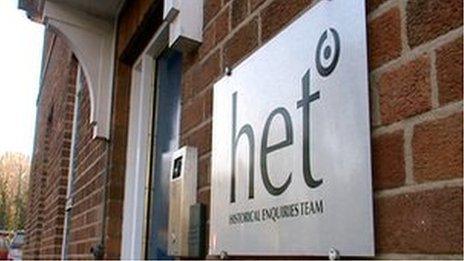Amnesty for Troubles killings is a political conundrum
- Published
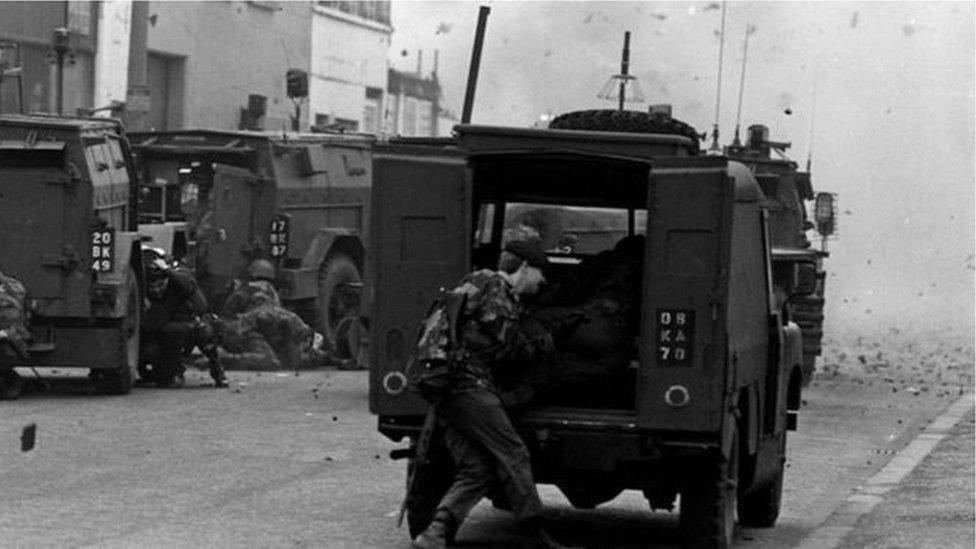
The government is now attempting to address the legacy of the Troubles that has haunted Northern Ireland for decades.
As a result of an agreement reached at Stormont in 2014 by Northern Ireland's political parties, legislation at Westminster is now planned to deal with the emotional and practical aftermath of a conflict in which more than 3,600 people were killed.
The pain of that loss remains today.
The government has published a series of proposals to be implemented over a five-year period at the cost of £150m.
They were put out to public consultation and produced a remarkable 16,000 replies.
The cornerstone is a new, independent Historical Investigations Unit (HIU) that will take over the caseload of those deaths reviewed by the Police Service of Northern Ireland (PSNI) that require further investigation.
It will also provide relatives with as much information and support as is possible.
But the government has avoided controversy by rejecting the most contentious and explosive issue of all. Amnesty.
There were attempts to have it included in the early draft of legislation, the result of a campaign by Northern Ireland veterans facing prosecution for killings decades ago.
Such an amnesty, legally defined as a "statute of limitations", was recommended by MPs on the Defence Select Committee and championed by veterans' supporters at Westminster and the military.
However, the amnesty envisaged only applied to soldiers, although arguably under international law, it could not be selective and, controversially, would have to apply to the IRA and other groups.
'End the bloody thing'
One of the veterans is the seriously ill, 77-year-old former Lifeguard Dennis Hutchings, due to stand trial next year for the attempted murder in 1974 of John Patrick Cunningham, a young man with learning difficulties who had no connection with the IRA.
Mr Hutchings denies the charge.
Ex-soldier Dennis Hutchings 'gutted' after court decision
Mr Hutchings believes that amnesty is the only way to draw a line under the Troubles and points out that the IRA already had an amnesty when more than 500 of its prisoners were released and around 200 of its fugitives received on the run letters from Tony Blair's government, allowing them to return home without prosecution.
In fact, the IRA prisoner release was not an amnesty as prisoners were only released on licence, and the so-called letters of comfort made it clear that there would still be prosecutions should new evidence be found.
"End the bloody thing," Dennis Hutchings says.
There were profound and deep-rooted disagreements between the Ministry of Defence, and the Northern Ireland Office about including amnesty in the legislation, based on their differing priorities.
Michael Kelly was killed on Bloody Sunday in Londonderry in 1972. His brother, John, epitomises the uncompromising demand of many victims' families. He too is opposed to any amnesty.
"Let's do the right thing - let's prosecute (them)," he said.
'It's got to be equal'
You might have thought that veterans, many of whom have seen their comrades murdered by the IRA, would bitterly oppose an amnesty being extended to the enemy. My experience of talking to veterans indicates the opposite.
Dennis Hutchings says it would not bother him, and "Phil" (not his real name) of the Parachute Regiment, one of the soldiers being investigated for Bloody Sunday, agrees.
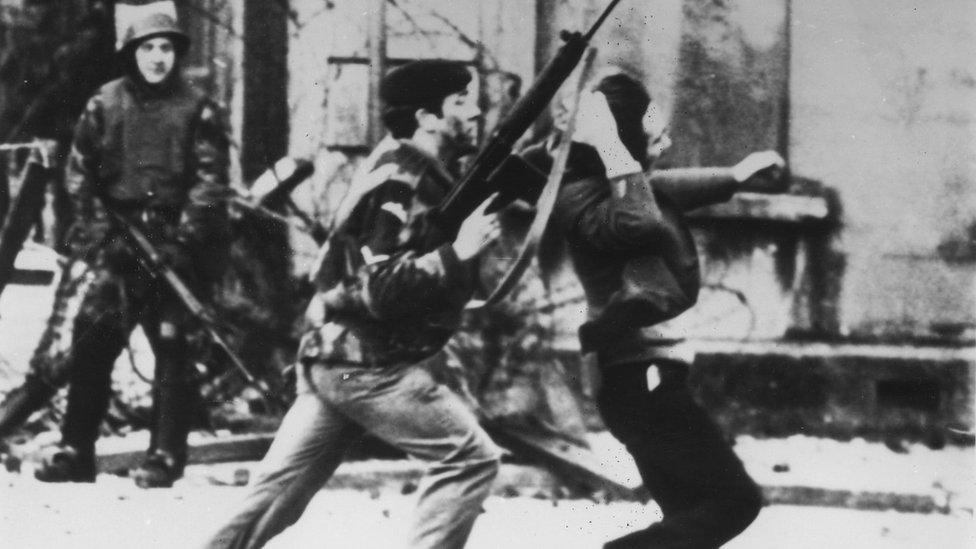
Thirteen people were killed on Bloody Sunday in January 1972 and another died of his injuries some months later
The veterans have a powerful ally in the former chief of the defence staff, Lord Richards.
"I think an amnesty would draw a line under the Troubles but it would probably have to be applied to both sides," he says.
"How much longer have people, getting into their middle, if not old, age now, got to put up with this?
"I would like to think that part and parcel of that process would be a drawing of the line and an agreement to get on with our lives and put it into the history books."
Lord Richards also has reservations about paratroopers being prosecuted for Bloody Sunday.
"My instinct is that they should not, but if there is no new evidence, my instinct is that these men have been through enough," he said.
"And we, as a nation, need to say enough is enough and let's put it behind us and crack on."
"Phil" has a blunt message for the Ministry of Defence: "I feel I've been betrayed because the high-ups are doing nothing to help me. It's time we stopped this - it's time we drew a line under it."
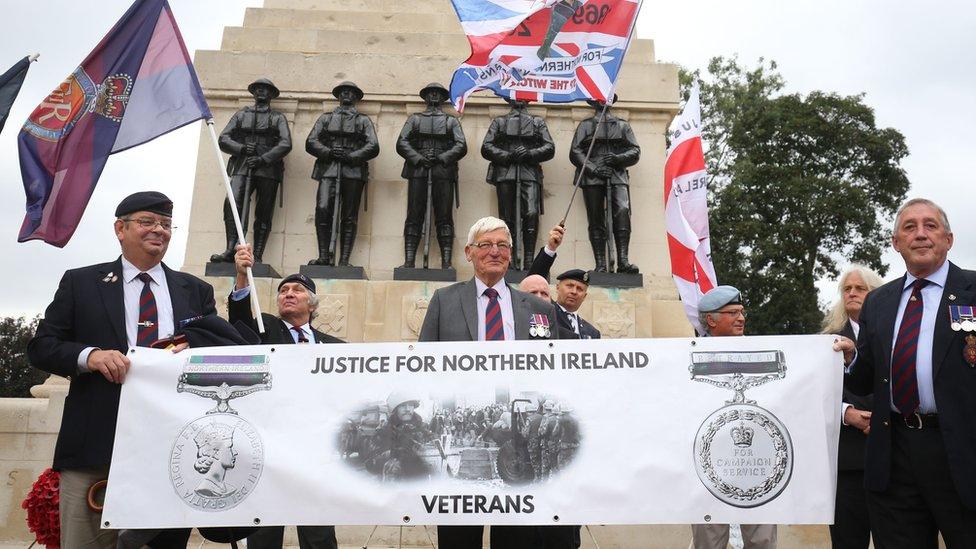
There has been a high-profile campaign to end the prosecution of former members of the security forces
Defence Secretary Gavin Williamson is undoubtedly sympathetic, having described the prosecution of veterans as a "ridiculous vendetta".
In a letter sent to the prime minister earlier this year, he expressed his support for an amnesty.
But Theresa May's reply to his letter gave the defence secretary no reason for political comfort.
"We cannot countenance a proposal where amnesties would be provided for terrorists," she wrote.
It was the equivalent of a Mrs Thatcher hand-bagging.
But as I found when I interviewed the defence secretary last week, his position has changed, perhaps in response to pressure from the Northern Ireland Office and Downing Street.
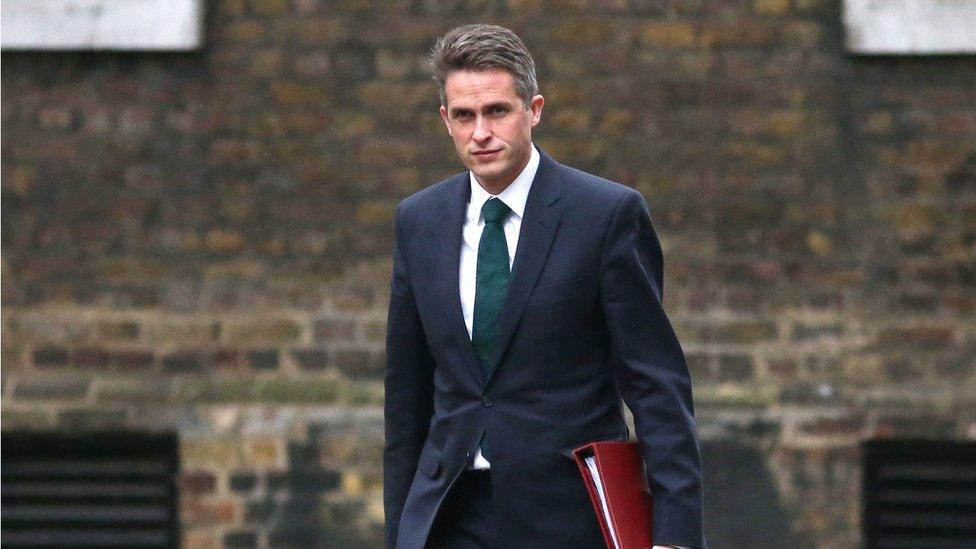
Gavin Williamson said an amnesty would give veterans "the protection they deserve"
When I asked him about his earlier support for a statute of limitations he said he could not comment on leaks in government. The former chief whip is nothing if not a political realist.
Nor does amnesty find support among Northern Ireland's police officers.
"I believe that we have the law and that we should all be equal before it," said PSNI Assistant Chief Constable George Clarke.
Political conundrum
Trapped between a rock and a hard place, the defence secretary is desperately trying to find a solution to the conundrum.
"No one would really want to see service personnel, who've served their country, being dragged through the courts," he said.
"We need to find a way to bring closure to the events of the past. When we're asking our service personnel to protect the people of the UK, to protect our country, I want to make sure that they've got as many safeguards as possible."
Given the political constraints, and with amnesty a political non-starter, any solution will inevitably be a compromise.
I reminded the defence secretary that the veterans wanted a decision and asked how quickly it was likely to come.
"As rapidly as possible," he replied.
"That's certainly something that we're hoping we can do early in the New Year."
Whether the result will satisfy the veterans and their supporters remains to be seen.
Drawing A Line Under the Troubles will be broadcast on Tuesday 11 December at 20:00 GMT on BBC Radio Four.
- Published6 July 2018
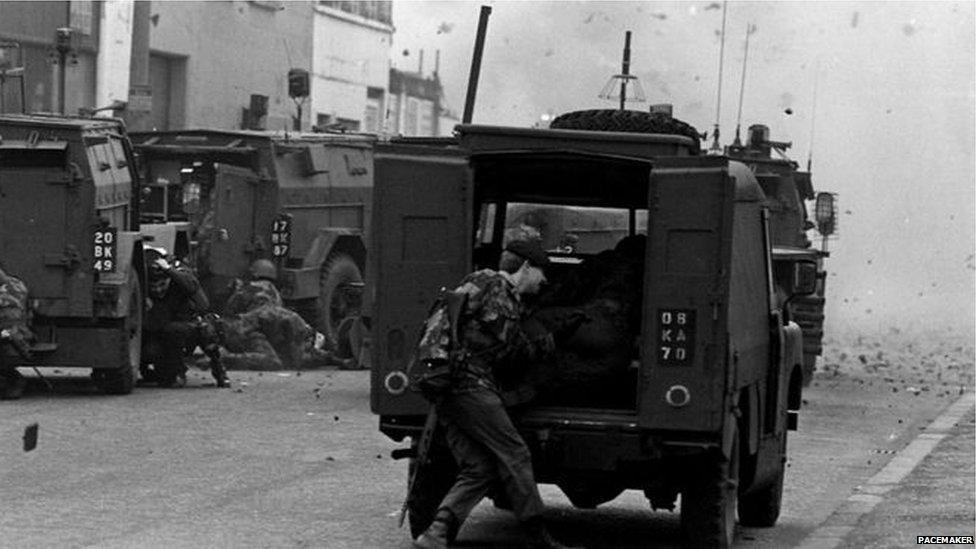
- Published5 October 2018

- Published9 May 2018
